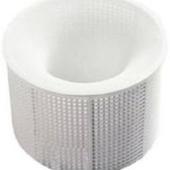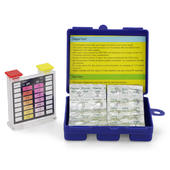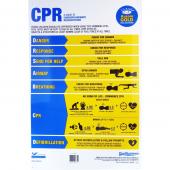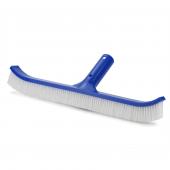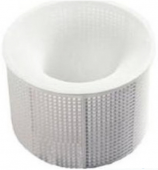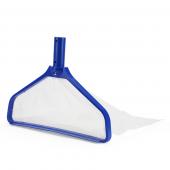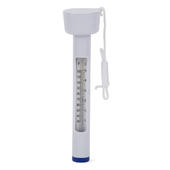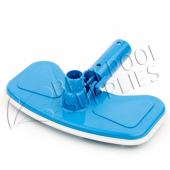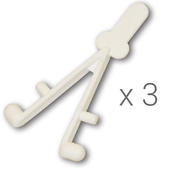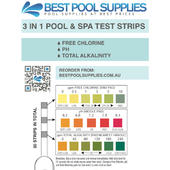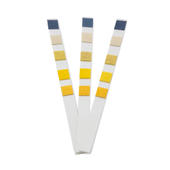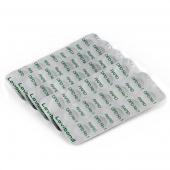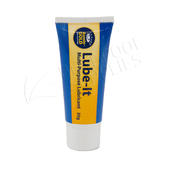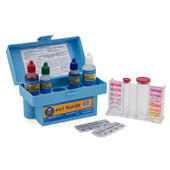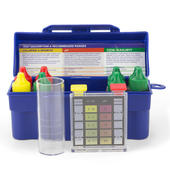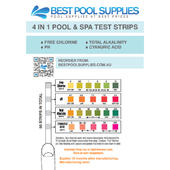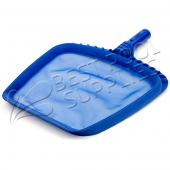
(07) 5551 6230 | Opening Times
Mon - Fri - 8.00am - 5:00pm (QLD Time)
Saturday - 8.00am - 1:00pm (QLD Time)
Sundays - CLOSED
Genuine Clearwater C140 Cell - Screw On
Genuine Zodiac Clearwater C140 Chlorinator Cell - Screw On

- O ring, locking ring, screw on.
- Standard cell.
- Plate type: Mesh
- Number of plates: 7
- Plate length: 120mm
- Amps: 15
Image is for illustration purposes only.
Although the cells provided by Best Pool Supplies is manufactured from high quality materials with longevity in mind, over the period of time the electrolysis will wear out the cell coating which will in the end result the electrodes to stop producing chlorine.
Here are some handy hints that help you to prolong the life span of your chlorinator cell:
- Don’t overwork your salt cell – running the chlorinator at 100% output or longer than 8 hours a day will shorten is life.
- Use Conditioner or Stabilizer to protect your chlorine from breaking up in the UV of the sun which will again prevent overworking your salt cell.
- Keep proper pH balance. PH level below 7.2 will etch the salt cell, and if above 7.6 will reduce the chlorine’s effectiveness. To reduce the PH use pool acid or dry acid and raise the PH using soda ash.
- Maintain proper salt level in the pool. Low salt levels will destroy the coating of the electrodes and high salt levels will overload the chlorinator.
- Inspect the cell regularly and once you notice scale build up on the electrodes clean it with appropriate Salt Cell Cleaner.
Calcium deposit (formation of scale) is one of the main reasons of premature failure of the chlorinator electrode. Scale on the electrodes will reduce the chlorine production, restrict the flow of the water and if not addressed it will put unnecessary strain not only on the cell but also on the powerpack and can cause damage to both. It is important to check the cell and clean the electrodes from scale when it becomes necessary.
How quickly calcium builds up on electrode(s) varies from pool to pool and depends on on various factors:
- Your geographic location – areas with hard water and when bore water is used the scale forms quite quickly.
- The pool finish - calcium from the pool plaster (concrete pools) or grouts (tiled pools) can raise the calcium levels of the pool water.
- Pool chemicals - super chlorinating with calcium hypochlorite affects pool water calcium content.
- Unbalanced PH level of the water plays role in calcium build up on the electrodes.
- Incorrect salt level.
If you your chlorinator is non self cleaning (does not reverse polarity) it is advisable to check the cell once a week (even more often during summer months). If the milky white substance starts to appear on the electrode(s) you know it is time to give the cell a clean.
These days most new chlorinators on the market are self cleaning. These units avoid scale build up on the electrodes by reversing the polarity between the electrodes, repelling mineral deposits, which are washed away by the pool water rushing through the cell housing before they can attach to the oppositely charged electrode. Even if the chlorinator is self cleaning, the cell still needs to be cleaned roughly once every 6 months (more often in hard water areas). Many of these intelligent units advise you when it is time to clean the cell and warn about low salt level in the pool water as well.
To clean the cell:
Switch off the chlorinator and remove the cell from the housing following manufacturer instructions.
- If the scale layer is not very heavy the deposits can be washed away with a garden hose. (NB! Do not brush the electrodes or scrape with sharp objects.)
- If the above does not help, it is needed to soak the cell in suitable cleaning solution like Salt Chlorinator Cleaner or self mixed acid solution. To prepare acid solution mix 1 part of Pool Acid (Hydrochloric Acid) with 5 parts of water in the bucket. Submerge the cell into the solution for 3-5 minutes. If it takes longer than 5 minutes to clean the cell it is an indication that the electrodes should be cleaned more frequently.
- Put the cell back into cell housing.
NB! Always take extra care when handling chemicals and store them out of the reach of children.
Genuine Zodiac Clearwater C140 Chlorinator Cell - Screw On

- O ring, locking ring, screw on.
- Standard cell.
- Plate type: Mesh
- Number of plates: 7
- Plate length: 120mm
- Amps: 15
Image is for illustration purposes only.
Although the cells provided by Best Pool Supplies is manufactured from high quality materials with longevity in mind, over the period of time the electrolysis will wear out the cell coating which will in the end result the electrodes to stop producing chlorine.
Here are some handy hints that help you to prolong the life span of your chlorinator cell:
- Don’t overwork your salt cell – running the chlorinator at 100% output or longer than 8 hours a day will shorten is life.
- Use Conditioner or Stabilizer to protect your chlorine from breaking up in the UV of the sun which will again prevent overworking your salt cell.
- Keep proper pH balance. PH level below 7.2 will etch the salt cell, and if above 7.6 will reduce the chlorine’s effectiveness. To reduce the PH use pool acid or dry acid and raise the PH using soda ash.
- Maintain proper salt level in the pool. Low salt levels will destroy the coating of the electrodes and high salt levels will overload the chlorinator.
- Inspect the cell regularly and once you notice scale build up on the electrodes clean it with appropriate Salt Cell Cleaner.
Calcium deposit (formation of scale) is one of the main reasons of premature failure of the chlorinator electrode. Scale on the electrodes will reduce the chlorine production, restrict the flow of the water and if not addressed it will put unnecessary strain not only on the cell but also on the powerpack and can cause damage to both. It is important to check the cell and clean the electrodes from scale when it becomes necessary.
How quickly calcium builds up on electrode(s) varies from pool to pool and depends on on various factors:
- Your geographic location – areas with hard water and when bore water is used the scale forms quite quickly.
- The pool finish - calcium from the pool plaster (concrete pools) or grouts (tiled pools) can raise the calcium levels of the pool water.
- Pool chemicals - super chlorinating with calcium hypochlorite affects pool water calcium content.
- Unbalanced PH level of the water plays role in calcium build up on the electrodes.
- Incorrect salt level.
If you your chlorinator is non self cleaning (does not reverse polarity) it is advisable to check the cell once a week (even more often during summer months). If the milky white substance starts to appear on the electrode(s) you know it is time to give the cell a clean.
These days most new chlorinators on the market are self cleaning. These units avoid scale build up on the electrodes by reversing the polarity between the electrodes, repelling mineral deposits, which are washed away by the pool water rushing through the cell housing before they can attach to the oppositely charged electrode. Even if the chlorinator is self cleaning, the cell still needs to be cleaned roughly once every 6 months (more often in hard water areas). Many of these intelligent units advise you when it is time to clean the cell and warn about low salt level in the pool water as well.
To clean the cell:
Switch off the chlorinator and remove the cell from the housing following manufacturer instructions.
- If the scale layer is not very heavy the deposits can be washed away with a garden hose. (NB! Do not brush the electrodes or scrape with sharp objects.)
- If the above does not help, it is needed to soak the cell in suitable cleaning solution like Salt Chlorinator Cleaner or self mixed acid solution. To prepare acid solution mix 1 part of Pool Acid (Hydrochloric Acid) with 5 parts of water in the bucket. Submerge the cell into the solution for 3-5 minutes. If it takes longer than 5 minutes to clean the cell it is an indication that the electrodes should be cleaned more frequently.
- Put the cell back into cell housing.
NB! Always take extra care when handling chemicals and store them out of the reach of children.
Recommended Products
Recommended Products
Aussie Gold Pool Water Test Kit 2 in 1 / Chlorine/Bromine & p...
More information about product
3 x 5-Pack Skimmer Socks / Filter Socks / Filter Saver...
More information about product
SwimSportz Swim Cord - Swimming Harness - Stationary Swimming System - 1.3 metre Cor...
More information about product
Skimmer Socks / Filter Socks / Filter Savers / 5-PAC...
More information about product
Vinyl Liner Repair Kit - Aussie Gold - Repair Pools, Spas, Airbeds, Inflatable...
More information about product
3 in 1 Swimming Pool & Spa Water Test Strips - 50 Strip...
More information about product
5 in 1 Swimming Pool & Spa Water Test Strips - 50 Strip...
More information about product
Aussie Gold Pool Water Test Kit 4 in 1 / Chlorine, pH, Acid, Alkalinit...
More information about product
Aussie Gold Hand & Pool Pole Pruner - Fits Standard Pool Telepole...
More information about product
4 in 1 Swimming Pool & Spa Water Test Strips - 50 Strip...
More information about product






 Available Online
Available Online


